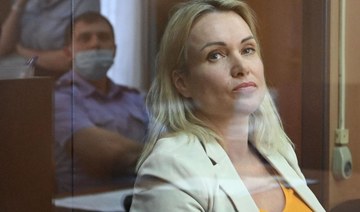WASHINGTON: The US Supreme Court on Monday agreed to hear a challenge to federal protections for Internet and social media companies freeing them of responsibility for content posted by users in a case involving an American student fatally shot in a 2015 rampage by Islamist militants in Paris.
The justices took up an appeal by the parents and other relatives of Nohemi Gonzalez, a 23-year-old woman from California who was studying in Paris, of a lower court’s ruling that cleared Google LLC-owned YouTube of wrongdoing in a lawsuit seeking monetary damages that the family brought under a US anti-terrorism law. Google and YouTube are part of Alphabet Inc. .
The Supreme Court also agreed to hear a separate appeal by Twitter Inc. of the lower court’s decision to revive a similar lawsuit against that company, though not on the basis of Section 230.
The lawsuit against Google accused it of materially supporting terrorism in violation of the Anti-Terrorism Act, a federal law that allows Americans to recover damages related to “an act of international terrorism.” The lawsuit alleged that YouTube, through computer algorithms, recommended videos by the Islamic State militant group, which claimed responsibility for the Paris attacks, to certain users.
The San Francisco-based 9th US Circuit Court of Appeals in 2021 dismissed the lawsuit in a ruling relying largely on another law, known as Section 230 of the Communications Decency Act of 1996.
Section 230, enacted before the rise of today’s major social media companies, protects “interactive computer services” by ensuring they cannot be treated as the “publisher or speaker” of any information provided by other users.
The lawsuit argued that such immunity should not apply when the company’s platform recommends certain content via algorithms that identify and display content most likely to interest users, based on how people use the service.
Section 230 has drawn criticism from across the political spectrum. Democrats have faulted it for giving social media companies a pass for spreading hate speech and misinformation. Republicans painted it as a tool for censorship of voices on the right, especially after Twitter and other platforms banned then-President Donald Trump from after a mob of his supporters attacked the US Capitol in a deadly riot on Jan. 6, 2021. Trump as president unsuccessfully sought its repeal.
Gonzalez was among 130 people killed in Paris during the 2015 attacks that included suicide bombings and mass shootings. She was at a bistro called La Belle Equipe when militants fired on the crowd of diners.
The plaintiffs said that YouTube’s algorithm helped Islamic State spread its militant message by recommending to users the group’s videos including those aimed at recruiting jihadist fighters, and that the company’s “assistance” was a cause of the 2015 attacks.
Gonzalez’s family appealed the 9th Circuit ruling to the Supreme Court, noting that while algorithms may suggest benign dance videos to some, “other recommendations suggest that users look at materials inciting dangerous, criminal or self-destructive behavior.”
The family added that removing Section 230 protections would prompt websites to stop recommending harmful materials, while saying that allowing the immunity “denies redress to victims who could have shown that those recommendations had caused their injuries, or the deaths of their loved ones.”
In the case against Twitter, American family members of Nawras Alassaf, a Jordanian citizen who died in a nightclub mass shooting in 2017 in Istanbul also claimed by Islamic State, accused that social media company of violating the anti-terrorism law by failing to police the platform for Islamic State accounts or posts.
The 9th Circuit in the same ruling reversed a federal judge’s decision to throw out the case against Twitter, but did not assess Twitter’s claim of immunity under Section 230.
Supreme Court to scrutinize US protections for social media
https://arab.news/5mku9
Supreme Court to scrutinize US protections for social media

- The hearing could challenge federal protections for Internet and social media companies freeing them of responsibility for content posted by users
RedBird IMI withdraws from Telegraph deal, to sell UK newspaper

- Abu Dhabi-backed investor group to sell media outlet following government ban on foreign entities owning national newspapers
- RedBird IMI says its focus is on securing the best price for the titles, but experts fear the asset could fecth a lower price than what was originally paid
LONDON: Abu Dhabi-backed RedBird IMI on Tuesday said it would sell the Telegraph after it scrapped its acquisition of the right-leaning newspaper group because government intervention meant the deal was “no longer feasible.”
RedBird IMI effectively took control of the Telegraph and the Spectator magazine in December when it repaid a debt owed by then-owner the Barclay family to Lloyds Bank, including a 600 million pound ($753 million) loan against the titles.
But the acquisition, which already faced a lengthy regulatory inquiry, was dealt a blow last month when Britain said it would stop foreign governments owning newspapers.
“RedBird IMI has today confirmed that it intends to withdraw from its proposed acquisition of the Telegraph Media Group and proceed with a sale,” a RedBird IMI spokesperson said.
“We have held constructive conversations with the government about ensuring a smooth and orderly sale for both titles.”
RedBird IMI, led by former CNN executive Jeff Zucker, is backed by Mansour bin Zayed Al Nahyan, a member of Abu Dhabi’s ruling family and the owner of Manchester City soccer club.
The government issued a notice in December stopping RedBird IMI transferring ownership of the newspaper or changing its management and board while it investigated the deal.
Culture Secretary Lucy Frazer said on Tuesday she would now allow RedBird IMI to conduct an orderly sale of the titles after it had signalled its intention to withdraw.
“Throughout this process I have raised concerns about the potential impact of this deal on free expression and accurate presentation of news, and I took steps to ensure that media freedom was protected while there was an investigation into those concerns,” she said.
RedBird IMI said its focus was on securing the best price for the titles, which are close to the ruling Conservatives.
Parties previously interested in the assets include hedge fund boss Paul Marshall, Daily Mail owner DMGT as well as private equity buyers.
Humanity at a turning point, Saudi minister tells WEF meeting in Riyadh
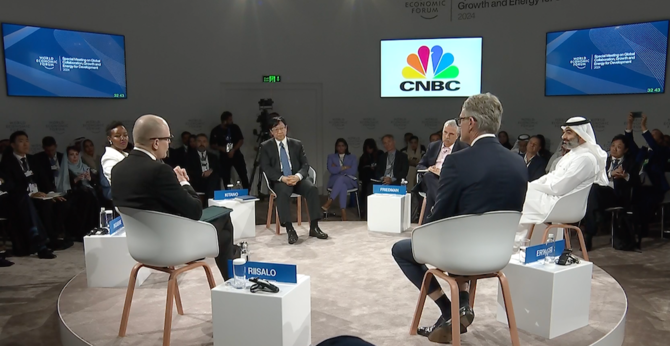
- Saudi Arabia wants to lead ‘intelligence revolution,’ Abdullah Al-Swaha, communications and information technology minister, says
- Industry leaders ‘must master AI within years or face irrelevance’
RIYADH: Humanity is at a turning point, pivoting from digital to artificial intelligence, and shifting from the industrial revolution to the intelligence revolution, a senior Saudi official told the special two-day World Economic Forum meeting in Riyadh.
“The world today is not at a tipping point but at a turning point in humanity, which means weare pivoting from digital to AI and maybe later on quantum,” Abdullah Al-Swaha, minister of communications and information technology, said.
Saudi Arabia is ready to embrace that shift, he added.
“The Kingdom is excited with its partnerships with countries and international organizations to carve a path toward inclusive AI adoption,” Al-Swaha told the panel.
“We are pushing today an inclusive agenda, that is innovative, and indisputably multistakeholder to make sure that we lead and leapfrog in this era.”
The Saudi minister noted that global economic output today is worth $100 trillion, of which $32 trillion is attributed to the labor force, and $1 trillion of that ‘is being augmented, accelerated and democratized by generated AI.’
“Over the next five to seven years, it is projected to go to 40 percent. That’s 43 percent of the labor force productivity. And this is why we are pivoting toward intelligence revolution,” Al-Swaha said.
He also cautioned that if “talents and leaders” did not master AI within six or seven years, “they will become irrelevant for any industry they are in.”
‘Saudi Arabia at forefront of AI,’ says business leader at World Economic Forum
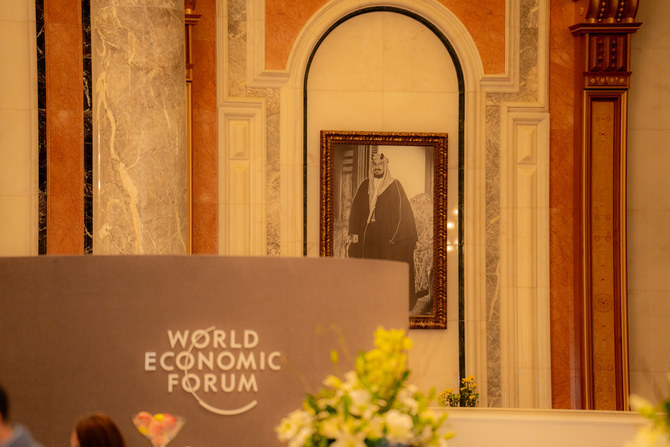
- Saudi Arabia 'really a driver of not only the economy of the region, but also the economy of the world,' says global vice chair and chair of Europe, MENA at consulting firm AlixPartners
RIYADH: Saudi Arabia’s role in technology advancement is helping to drive not only the regional but also the global economy, business leaders told Arab News at the World Economic Forum special meeting in Riyadh on Sunday.
The Kingdom has been “at the forefront” on artificial intelligence, Stefano Aversa, global vice chair and chair of Europe, the Middle and North Africa at consulting firm AlixPartners, said.
While the war in Gaza and broader Middle East tensions are expected to get top billing at the WEF Special Meeting on Global Collaboration, Growth and Energy for Development, technology’s role as a driver of change is also expected to be a major talking point.
Around 1,000 leaders from 92 countries have gathered in Riyadh for the two-day forum.
Saudi Arabia is “really a driver of not only the economy of the region, but also the economy of the world,” Aversa said.
“There are a lot of investors interested, and so it is important to stay close to some of the giga-projects here that will drive not only the growth of the Kingdom, but also the growth of some entire sectors, like energy transition.”
He said that the Kingdom’s move from “an early stage of development to more mature selective investment” is also important.
AlixPartners CEO Simon Freakley said that disruption is a looming issue for global industries ranging from automotive and aerospace to retail.
He defined disruption as “displacement of businesses, markets, and value networks as a result of economic, societal, environmental, political, regulatory, or technological changes.”
Freakley told Arab News that shipping routes, for example, faced disruption because of tensions in the Red Sea.
“Problems are caused by conflicts around the world or other challenges. What we’re finding is some of these themes go cross-industry, not just within industry.”
AlixPartners has 26 offices in 14 countries. Its fifth annual Disruption Index, based on a survey of 3,100 senior executives around the world, showed that 61 percent of CEOs worry they will be unable to keep pace with changing business cycles.
Freakley said: “This disruption work that we now do every year has become a sort of a touchstone of how we help people understand what the best companies, the best leaders, are doing.”
The consulting firm has predicted AI will become the single biggest driver of change across industries, not only as a defense against competitors, but also as a tool to enhance go-to market strategies.
“The people that are winning are the people that have the best data, and weaponize their data to actually get a competitive advantage. How people are using AI and the insight from their data to drive their growth is where we see the real opportunity,” Freakley said.
Two Russian journalists jailed on ‘extremism’ charges for alleged work for Navalny group
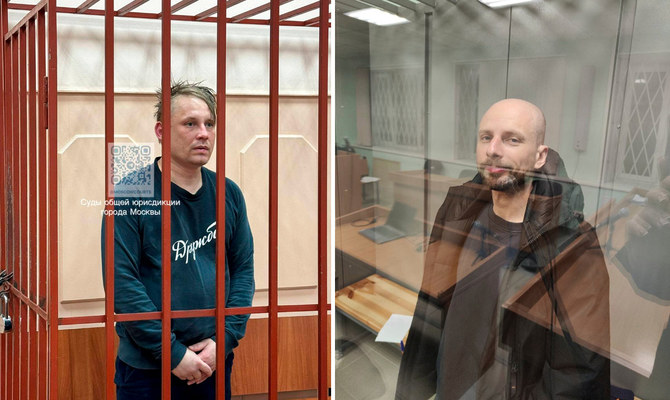
- Konstantin Gabov and Sergey Karelin both denied the charges for which they will be detained for a minimum of two months before any trials begin
- Russia’s crackdown is aimed at opposition figures, journalists, activists, members of the LGBTQ+ community, and other dissenters
LONDON: Two Russian journalists were arrested by their government on “extremism” charges and ordered by courts there on Saturday to remain in custody pending investigation and trial on accusations of working for a group founded by the late Russian opposition politician Alexei Navalny.
Konstantin Gabov and Sergey Karelin both denied the charges for which they will be detained for a minimum of two months before any trials begin. Each faces a minimum of two years in prison and a maximum of six years for alleged “participation in an extremist organization,” according to Russian courts.
They are just the latest journalists arrested amid a Russian government crackdown on dissent and independent media that intensified after its full-scale invasion of Ukraine more than two years ago. The Russian government passed laws criminalizing what it deems false information about the military, or statements seen as discrediting the military, effectively outlawing any criticism of the war in Ukraine or speech that deviates from the official narrative.
A journalist for the Russian edition of Forbes magazine, Sergei Mingazov, was detained on charges of spreading false information about the Russian military, his lawyer said Friday.
Gabov and Karelin are accused of preparing materials for a YouTube channel run by Navalny’s Foundation for Fighting Corruption, which has been outlawed by Russian authorities. Navalny died in an Arctic penal colony in February.
Gabov, who was detained in Moscow, is a freelance producer who has worked for multiple organizations, including Reuters, the court press service said. Reuters did not immediately comment on the ruling by the court.
Karelin, who has dual citizenship with Israel, was detained Friday night in Russia’s northern Murmansk region.
Karelin, 41, has worked for a number of outlets, including for The Associated Press. He was a cameraman for German media outlet Deutsche Welle until the Kremlin banned the outlet from operating in Russia in February 2022.
“The Associated Press is very concerned by the detention of Russian video journalist Sergey Karelin,” the AP said in a statement. “We are seeking additional information.”
Russia’s crackdown on dissent is aimed at opposition figures, journalists, activists, members of the LGBTQ+ community, and ordinary Russians critical of the Kremlin. A number of journalists have been jailed in relation to their coverage of Navalny, including Antonina Favorskaya, who remains in pre-trial detention at least until May 28 following a hearing last month.
Favorskaya was detained and accused by Russian authorities of taking part in an “extremist organization” by posting on the social media platforms of Navalny’s Foundation. She covered Navalny’s court hearings for years and filmed the last video of Navalny before he died in the penal colony.
Kira Yarmysh, Navalny’s spokeswoman, said that Favorskaya did not publish anything on the Foundation’s platforms and suggested that Russian authorities have targeted her because she was doing her job as a journalist.
Evan Gershkovich, a 32-year-old American reporter for The Wall Street Journal, is awaiting trial on espionage charges at Moscow’s notorious Lefortovo Prison. Both Gershkovich and his employer have vehemently denied the charges.
Gershkovich was detained in March 2023 while on a reporting trip and has spent over a year in jail; authorities have not detailed what, if any, evidence they have to support the espionage charges.
The US government has declared Gershkovich wrongfully detained, with officials accusing Moscow of using the journalist as a pawn for political ends.
The Russian government has also cracked down on opposition figures. One prominent activist, Vladimir Kara-Murza was sentenced to 25 years.
US State Department Arabic spokesperson resigns in opposition to Gaza policy
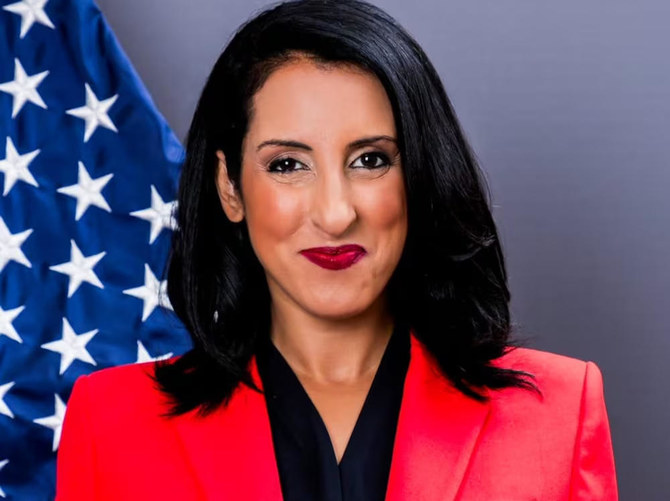
- Hala Rharrit is at least the third person to resign from the department over the issue
WASHINGTON: The Arabic language spokesperson of the US State Department has resigned, citing her opposition to Washington’s policy related to the war in Gaza, in at least the third resignation from the department over the issue.
Hala Rharrit was also the Dubai Regional Media Hub’s deputy director and joined the State Department almost two decades ago as a political and human rights officer, the department’s website showed.
“I resigned April 2024 after 18 years of distinguished service in opposition to the United States’ Gaza policy,” she wrote on social media website LinkedIn. A State Department spokesperson, asked about the resignation in Thursday’s press briefing, said the department has channels for its workforce to share views when it disagrees with government policies.
Nearly a month earlier, Annelle Sheline of the State Department’s human rights bureau announced her resignation, and State Department official Josh Paul resigned in October.
A senior official in the US Education Department, Tariq Habash, who is Palestinian-American, had stepped down in January.
The United States has come under mounting criticism internationally and from human rights groups over its support for Israel amid Israel’s ongoing assault in Gaza that has killed tens of thousands and caused a humanitarian crisis.
There have been reports of signs of dissent in the administration of President Joe Biden as deaths continue to grow in the war.
In November, more than 1,000 officials in the US Agency for International Development (USAID), part of the State Department, signed an open letter calling for an immediate ceasefire. Cables criticizing the administration’s policy have also been filed with the State Department’s internal “dissent channel.”
The war has also caused intense discourse and anti-war demonstrations across the United States, Israel’s most important ally.
Palestinian Islamist group Hamas attacked Israel on Oct. 7, killing 1,200 people, according to Israeli tallies. Israel has killed over 34,000 people in Hamas-governed Gaza, according to Gaza’s health ministry, leading to widespread displacement, hunger and genocide allegations that Israel denies.










